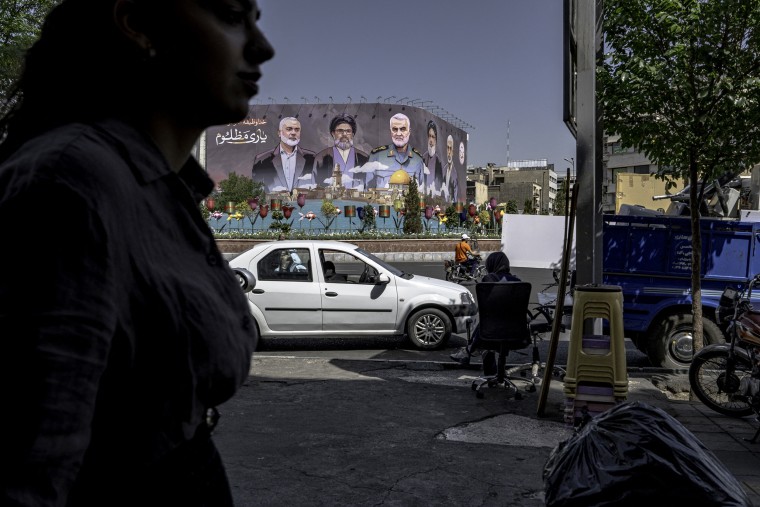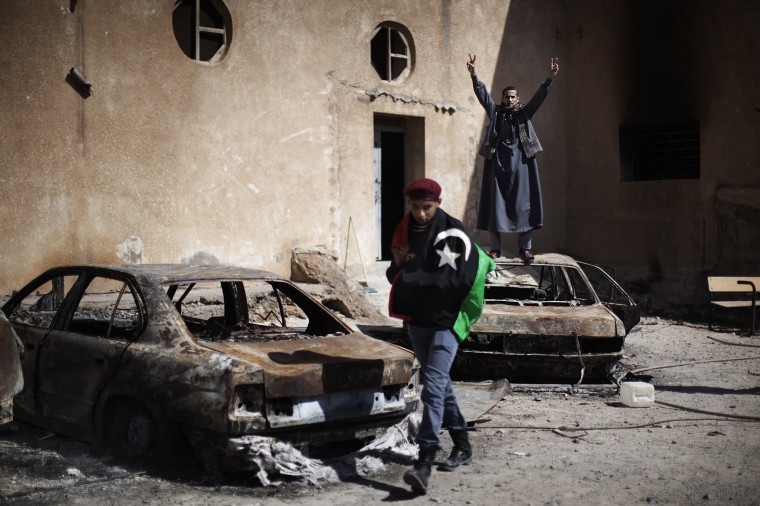Just as the streets of Tehran and Tel Aviv are strewn with debris, history is littered with cautionary tales of regime change.
Does Israel want only to neuter Iran's nuclear program or is it seeking to topple the regime itself? This is the central question hanging over its barrage of the Islamic Republic.
Though his government denies it is an official goal, Israeli Prime Minister Benjamin Netanyahu has urged Iranians to use this opportunity to rise up against their clerical rulers. And his targets telegraph that he is at least seeking to weaken the regime rather than just cripple its centrifuges, analysts have told NBC News.
Past examples of successful Western-backed regime change are rare — while calamities abound. That's partly why President Donald Trump has said he is so against foreign interventionism — though he has found that trickier in practice.

“There is a basic principle that it’s really easy to break things but really hard to put them back together,” said Brian Klaas, an associate professor in global politics at University College London. “Imposing external regime change is not the most difficult thing to do. But then there’s the question of what comes next: usually power vacuums and infighting.”
Crucially, he says, there are often misguided assumptions in the United States and elsewhere that everyone in these countries wants a Western-friendly alternative. That is the case here, he adds.
“There are people in Iran who are upset that the regime is not hard-line enough, and there’s also people in Iran who want to have a Western-style, reformist regime,” Klaas said, adding that if the regime collapsed, “they would battle it out” — politically or perhaps violently.
Indelibly seared into this debate are three major military interventions this century by the U.S. and its allies: Iraq, Afghanistan and Libya.
In Afghanistan, a Washington-led coalition toppled the Taliban in 2001. Over the next two decades, the U.S. would spend $2.3 trillion — and see 2,324 U.S. military personnel and 3,917 contractors killed — only to see the Islamist group regain power anyway.
The fall of Iraq’s Saddam Hussein in 2003 led to then-President George W. Bush to declare “Mission Accomplished” on a banner aboard the USS Abraham Lincoln. That proved to be one of history’s colossal understatements.

Iraq descended into a deadly insurgency and then full-blown sectarian civil war. After American troops left in 2011, the Islamic State terrorist group flourished and was able to establish its own caliphate — a religious kingdom — before America and its allies returned again to wipe ISIS out.
Meanwhile, in Libya, Moammar Gadhafi responded to 2011’s Arab Spring protests with lethal force, killing hundreds of protesters. NATO launched airstrikes and Gadhafi was captured and killed. But three years later, Libya descended into a three-way civil war and today remains a failed state.
The toxicity of these escapades in the minds of many Americans is partly why Trump and his Republican supporters are so avowedly against interventionism.
Whereas past presidents have said, as George W. Bush did, that U.S. interests were served by bringing “the hope of democracy, development, free markets, and free trade to every corner of the world,” Trump has reverted to America's isolationist instincts of the 1930s.
However, though he has vowed to keep the U.S. out of “forever wars” in the Middle East and instead focus on "America First" policies, he has found it harder to extricate Washington from its conflict role in Ukraine and the Palestinian territories.
Before those 21st century hostilities, the Cold War was replete with American attempts to shape geopolitics, from Vietnam to Haiti and Angola to Nicaragua.
But examples of successful regime change are so scant that some scholars say finding such an example requires going back even further: defeating the Nazis and the Japanese empire at the end of World War II and eventually fostering democratic reforms in West Germany and Japan.
“Short of this, it’s pretty hard to identify successful cases,” said Leslie Vinjamuri, director of the U.S. and Americas program at Chatham House, a London think tank.

The reason that was successful was that the scale of the threat was global and existential, and so the commitment of the Allies was total, Vinjamuri said.
“The problem comes when states are ambivalent about their interests and commitments,” she added.
Even then, unforeseen consequences can emerge decades later — no less than in Iran itself.
In 1953, the CIA backed a coup against Iran’s democratically elected Prime Minister Mohammad Mosaddegh and installed Shah Mohammad Reza Pahlavi in his place. That sowed the seeds of 1979’s Islamic Revolution — and with it the anti-Western, repressive theocracy of Iran today.
This week, Trump is considering a possible military strike on Iran — openly musing that he could kill Iranian Supreme Leader Ayatollah Ali Khamenei but that he was choosing not to for now.
Among those alarmed at the prospect of regime change is French President Emmanuel Macron, who warned Tuesday it would create "chaos" in the region.
Even if Trump did remove Khamenei, “assassinating the man at the top” rarely works, said Nic Cheeseman, a professor of democracy at England’s University of Birmingham. “Political systems are deeply entrenched and chopping off the most visible head of the hydra doesn’t mean the whole system will collapse.”
Rather than using violence — “which can encourage further conflict in the future” — a stable government “is more likely to happen if it is achieved by domestic protest and social movements,” he said. “The population also gets a founding democratic myth that can be recalled during future moments of struggle.”
